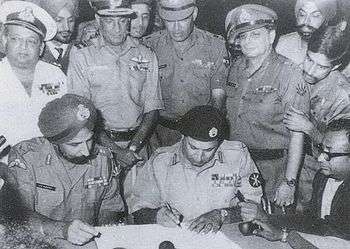Pakistani Instrument of Surrender
The Pakistani Instrument of Surrender (Bengali: পাকিস্তানের আত্মসমর্পণের দলিল, Pākistānēr Atmasamarpaṇēr Dalil ) was a written agreement that enabled the surrender of the Pakistan Armed Forces Eastern Command on 16 December 1971, thereby ending the Bangladesh Liberation War. The signing of the document marked the end of the Indo-Pakistani War of 1971 and the creation of the nation of Bangladesh.
| Pakistani Instrument of Surrender | |
|---|---|
| Created | 16 December 1971 |
| Signatories | Lt.Gen. A A K Niazi Lt.Gen. Jagjit Singh Aurora |
| Purpose | Surrender of the Pakistan Armed Forces Eastern Command in the Bangladesh Liberation War and Indo-Pakistani War of 1971 |
The day is commemorated as Victory Day, a national holiday, in Bangladesh; and as Vijay Diwas on the Indian military calendar.
Surrender ceremony

The surrender ceremony took place at the Ramna Race Course garden in Dhaka (then the capital of East Pakistan, now the capital of Bangladesh) on 16 December 1971. Lieutenant-General A A K Niazi, Martial Law Administrator of East Pakistan, surrendered to Lieutenant General Jagjit Singh Aurora, Joint Commander of Indian and Bangladeshi Forces. Air Commodore A. K. Khandker, Deputy Chief of Staff of the Bangladesh Forces, represented the Provisional Government of Bangladesh at the surrender.[1]
Also present were Rear-Admiral Mohammad Shariff, Commander of the Pakistani Naval Eastern Command and Air Vice-Marshal Patrick D. Callaghan of the Pakistan Air Force's Eastern Air Force Command, who signed the agreement. Lt. Gen Sagat Singh, Commander of the Indian IV Corps, Air Marshal Hari Chand Dewan, Commander of Indian Eastern Air Command, Maj Gen JFR Jacob, Chief of Staff of the Indian Eastern Command, acted as witnesses on behalf of India.
Aurora accepted the surrender without a word, while the crowd on the race course erupted in celebrations.[2]
Text of the Instrument
The text of the surrender is now a public property of Indian, Bangladeshi and Pakistani governments and the text of the document can be seen on display in the National Museum in New Delhi. The text of the Instrument of Surrender document was as follows:[3][4]
| The PAKISTAN Eastern Command agree to surrender all PAKISTAN Armed Forces in BANGLA DESH to Lieutenant-General JAGJIT SINGH AURORA, General Officer Commanding in Chief of Indian and BANGLA DESH forces in the Eastern Theatre. This surrender includes all PAKISTAN land, air and naval forces as also all para-military forces and civil armed forces. These forces will lay down their arms and surrender at the places where they are currently located to the nearest regular troops under the command of Lieutenant-General JAGJIT SINGH AURORA.
The PAKISTAN Eastern Command shall come under the orders of Lieutenant-General JAGJIT SINGH AURORA as soon as the instrument has been signed. Disobedience of orders will be regarded as a breach of the surrender terms and will be dealt with in accordance with the accepted laws and usages of war. The decision of Lieutenant-General JAGJIT SINGH AURORA will be final, should any doubt arise as to the meaning of interpretation of the surrender terms. Lieutenant General JAGJIT SINGH AURORA gives a solemn assurance that personnel who surrender shall be treated with dignity and respect that soldiers are entitled to in accordance with provisions of the GENEVA Convention and guarantees the safety and well-being of all PAKISTAN military and para-military forces who surrender. Protection will be provided to foreign nationals, ethnic minorities and personnel of WEST PAKISTANI origin by the forces under the command of Lieutenant-General JAGJIT SINGH AURORA. | |
| <signed> | <signed> |
(JAGJIT SINGH AURORA) |
(AMIR ABDULLAH KHAN NIAZI) |
Sources
- "Instrument of Surrender of Pakistani forces in Dacca", Hosted by Ministry of External Affairs, India
- "The Separation of East Pakistan"
References
- Howard S. Levie (January 1974). "The Indo-Pakistani Agreement of August 28, 1973". American Journal of International Law. American Society of International Law. 68 (1): 95–97. JSTOR 2198806.
- Kuldip Nayar (3 February 1998). "Of betrayal and bungling". Indian Express. Retrieved 17 May 2014.
- "The Instrument of Surrender". Virtual Bangladesh. 2015.
- "The Separation of East Pakistan". Story of Pakistan. 1 June 2003. Retrieved 28 July 2020.